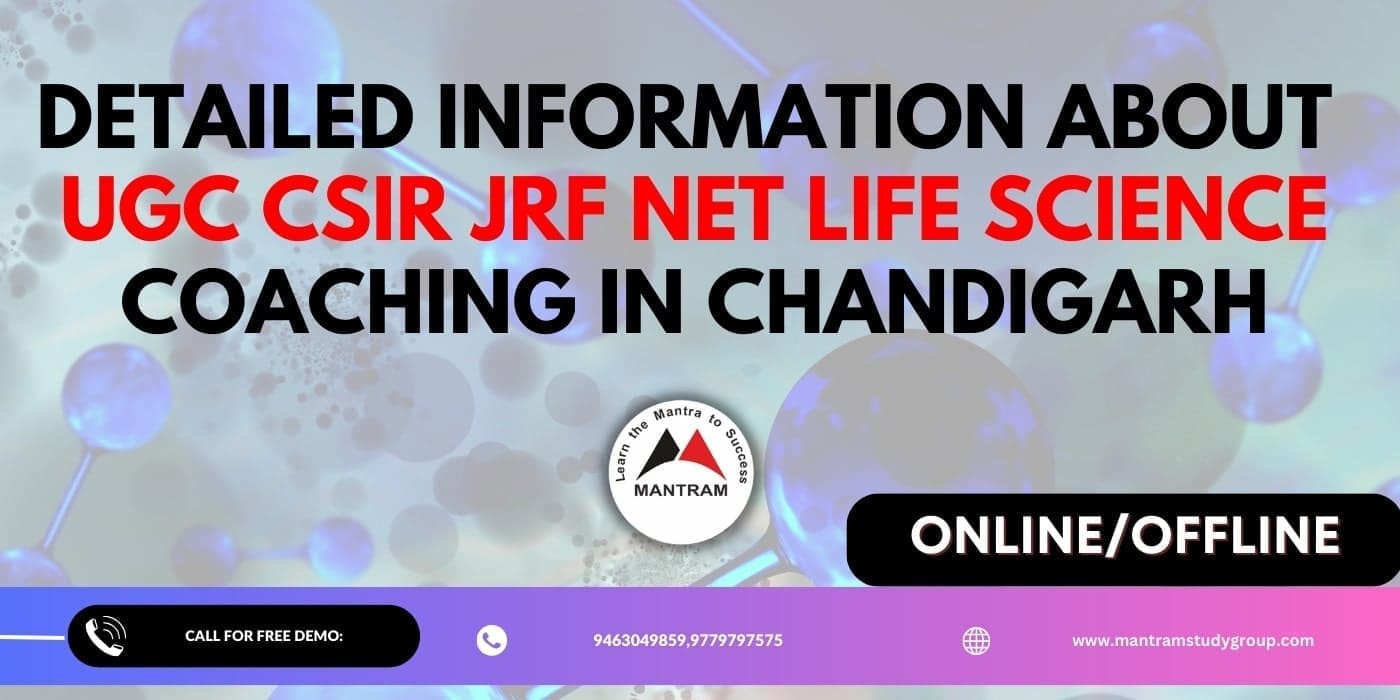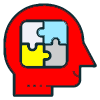
Detailed information about UGC CSIR JRF Net Life Science Coaching in Chandigarh
Detailed information about UGC CSIR JRF Net Life Science Coaching in Chandigarh
The University Grants Commission (UGC) National Eligibility Test (NET) for Junior Research Fellowship (JRF) is an exam conducted to determine eligibility for lectureship and for the award of JRF in Indian universities and colleges. The Exam consists of three papers - Papers I, II and III.
Paper I is a general and tests teaching and reasoning ability, reading comprehension, communication, etc. Paper II tests subject knowledge in one of the chosen subjects, such as life sciences. Paper III is for candidates who qualify for UGC NET and are eligible for JRF. It tests aptitude in research and teaching.
The UGC NET Life Sciences exam aims to test conceptual understanding, reasoning ability and application of biological knowledge on various aspects of biology, such as basic processes, biodiversity, genetics, evolution, physiology, biochemistry, etc.
CSIR NET Life Science Exam Preparation Coaching
Syllabus for UGC NET Life Sciences Paper II:
The UGC NET Life Sciences syllabus is vast and includes topics from botany, zoology, genetics, ecology, evolution, cell biology, molecular biology, human physiology and applied biology. Some key areas covered are:
Molecules and their interaction relevant to biology: Structure and functions of essential biomolecules like carbohydrates, lipids, proteins and nucleotides. Enzyme kinetics, mechanism of enzyme action. Molecular basis of self-assembly, conformations of nucleic acids and proteins.
Fundamental processes: pH, buffers, thermodynamics, entropy and free energy changes in biological systems. Intra- and inter-cell transport, membrane structure and function. Signal transduction pathways, amplification and damping in signaling.
Cellular organization: Structure-function relationship of cell membranes, cell organelles, cytoskeleton and cell wall. Chromatin structure and packaging. Cell division, including regulation of cell cycle.
Mendelian principles: Dominance, segregation, independent assortment. Concept of gene, allele, chromosome, genotype, phenotype. Inheritance patterns. Linkage, crossing over and genetic mapping.
Developmental biology: Basic concepts and models. Cellular basis of development in animals, embryonic stem cells. Genetic and molecular basis of development in Drosophila, Caenorhabditis elegans and Arabidopsis.
Diversity of life forms: Principles of taxonomy and evolution. Systematics of plant and animal kingdoms. Species concept, speciation. Theories of biological evolution. Human evolution and the emergence of the human race.
Ecological principles: Ecosystems structures and functions. Population ecology, community ecology and conservation biology.
Basic biochemistry: Structure-function relationship of biomolecules, metabolism, glycolysis, TCA and oxidative phosphorylation, lipids, amino acids.
Human physiology: Digestion and absorption, circulation, respiration, neural and endocrine control mechanisms.
Along with studying these topics, candidates should also focus on enhancing their reasoning, critical analysis and problem-solving skills.
Practicing previous years' papers and mock tests and improving speed and accuracy are also very important. The key is thorough conceptual clarity combined with good analytical skills.
Some tips for adequate preparation are:
- Make notes for quick revision covering all essential topics
- Solve previous years' UGC NET papers
- Attempt mock tests which help assess the level of preparation
- Read NCERT books for strengthening fundamentals
- Refer to research papers and good reference books/resources
- Revise all important laws, theories, definitions, diagrams, etc.
- Work on your weaknesses and improve speed and accuracy
- Stay motivated and focused during your preparation
The UGC NET exam requires thorough subject knowledge, analytical approach, and practice. Prepare systematically using updated study material and testing yourself with practice papers. Structured preparation over a consistent period is vital for cracking this Exam.
UGC JRF NET Economics Exam Preparation Coaching
UGC net life science coaching in Chandigarh
Chandigarh has become a prominent coaching hub for students preparing for the UGC National Eligibility Test (NET) exam, especially in life sciences.
Several reputed institutes offer specialized UGC NET life science coaching in Chandigarh, helping students master the syllabus and exam pattern.
Key topics covered in such coaching programs include cell biology, genetics, evolution, plant and animal physiology, biochemistry, ecology, and biotechnology.
The coaching provides comprehensive classroom teaching coupled with test series and doubt-solving sessions. Students are given access to previous years' question papers, model test papers, and UGC NET life science study material to aid their preparation.
Some prominent UGC NET life science coaching institutes in Chandigarh include Excellence Coaching Centre, Vision Institute, The Achievers' Academy and The Scholars' Choice.
With expert guidance, regular assessments and a rigorous preparation routine, many students from these coaching centers in Chandigarh have successfully cracked the UGC NET exam over the years.
The strategic location, education-friendly environment and extensive coaching infrastructure make Chandigarh an ideal destination for UGC NET aspirants looking to specialize in life sciences subjects.
UGC net life science syllabus
Here are some critical details about the UGC NET life sciences syllabus:
Units Covered
- Molecular Biology
- Cell Biology
- Genetics
- Evolution
- Ecology
- Botany
- Zoology
- Basic Biochemistry
- Immunology
- Anatomy
- Physiology
- Microbiology
- Biotechnology
The syllabus focuses on the fundamentals of the above topics and their applications. It covers these areas' principles, processes, techniques, and current developments.
Some major areas include:
- Structure, function and processes of cell organelles
- Cell division and cell cycle
- Gene structure, DNA replication, repair and recombination
- Chromosomal structure and gene expression regulation
- Principles of Mendelian inheritance
- Biological evolution theories
- Ecosystem structure and dynamics
- Diversity of plant and animal life
- Structure-function aspects of biomolecules
- Basic immunology and immune techniques
- Organ system structure and mechanisms
The UGC NET exam will assess the candidates' critical thinking, reasoning skills and conceptual grasp in the above areas of life sciences.
The paper contains objective-type, multiple-choice questions. Understanding the syllabus areas will help candidates better prepare for the Exam.
UGC net life science mock test
Here are some key things to know about UGC NET life science mock tests:
Mock tests are essential for UGC NET life science exam preparation to help assess your knowledge and identify areas for improvement. They simulate the actual exam environment and format.
Several websites and coaching institutes offer online or offline mock tests for paper one and paper 2 of the UGC NET life sciences exam are Mantram Study Group, Chandigarh.
The mock tests have questions formatted like the actual Exam, with multiple-choice questions for each paper. They cover all subjects like zoology, botany, environment science, biochemistry, microbiology, cell biology, genetics, evolution, etc.
You should take as many full-length mock tests as possible to build exam temperament and time management skills and assess preparation level. Review each test thoroughly to identify weak areas.
Apart from complete tests, many sites also allow you to generate chapter-wise or subject-wise tests for focused practice. You can take sectional mock tests, too.
Make a note of your mock test scores - your target should be to score 60% or more in paper 1 and 55% or more in paper 2.
Use mock tests in the last 2-3 months of preparation to check readiness and take enough tests to identify test-taking patterns/strengths.
Best life science coaching near me in Chandigarh
Mantram Study Group is the premier coaching institute and CSIR-UGC-NET Life Science Coaching leader in Chandigarh. As a life science coaching institute, we endeavor to equip the students fully for this examination.
Our primary focus is to provide specialized coaching in life sciences so that maximum students benefit from our programmes, such as Regular Courses, Online Courses, Weekend courses and Crash Courses for CSIR UGC net life science coaching.
UGC JRF NET Sociology Exam Preparation Coaching
FAQ
Is there a UGC NET for life science?
Some of the significant topics mentioned in the CSIR NET Life Science syllabus are- Cellular Organization, The CSIR UGC NET Life Science cutoff for the UR category in June 2022 was 98.81% and 97.50% for Junior Research Fellow and Assistant Professor, respectively.
What is the JRF exam for life science?
The ICMR-JRF life science examination is a competitive exam conducted by the Indian Council of Medical Research (ICMR) to award Junior Research Fellowships (JRFs) to students who wish to pursue a PhD in life sciences.
What is CSIR NET Life Sciences?
CSIR NET Life Science Syllabus is published by Human Resource Development Group (HRDG) in the official notification. It is a popular exam with a high level of competition.
The CSIR NET exam is held to test candidates' eligibility for the Assistant Professor and Junior Research Fellowships posts.
Who is eligible for CSIR NET Life Science?
CSIR NET Eligibility 2023: Age Limit, Qualification for JRF, LS
As per the CSIR NET Eligibility, candidates must have a BE, B. Tech, B. Pharma, MSc, MBBS, Integrated BS-MS, or any other science degree with a minimum of 55%. And, Candidates in the reserved category can receive a 5% mark relaxation.
Is net life science easy?
This Exam is quite challenging, and candidates must plan their actions. This is one of the most effective strategies for CSIR NET Life Science to crack the CSIR NET exam; candidates must lay out an effective study plan and proceed accordingly.
Is the UGC NET Exam difficult?
Is the NET JRF Exam tough? Yes, the national level exam is challenging, but the aspirants who prepare a proper study plan and NET UGC Preparation strategy can crack the Exam on the first attempt. Also, aspirants are advised to prepare in advance and give at least six months to achieve their goals.
We hope you like our article on "UGC CSIR JRF Net Life Science Coaching in Chandigarh".
Thanks for visiting our website Mantram Study Group.
You may also join Mantram for NORCET Coaching.
- How do you Clear Net Life Science
- Is it necessary to take Coaching for CSIR NET Life Science
- Best CSIR Net Life Science online coaching in India
- Top 20 Major Points about CSIR NET Life Science
- Top 20 Major Points about UGC CSIR JRF Net Life Science
You can also search about by using these keywords :-
CSIR Net Life Science Syllabus, Life Science Courses, CSIR Net Coaching, CSIR Net Online Coaching, CSIR Net Life Science Coaching, Best Online Coaching For CSIR Net Life Science, Best Coaching For CSIR Net Life Science, Net Life Science Coaching, Bioscience Guru, Best CSIR Net Coaching In India, Best CSIR Net Coaching, Best Coaching Institute For CSIR Net, Life Sciences Coaching In Chandigarh, CSIR Online Coaching
Testimonials
 It is a great educational institution for UGC CSIR JRF Net Life Science Coaching in Chandigarh. Their teacher helped me learn a lot in class. They cleared everyone's doubts one by one. Mantram has very hardworking teachers. They taught us a lot in class. They taught us not only lessons but also lessons for our lives.
It is a great educational institution for UGC CSIR JRF Net Life Science Coaching in Chandigarh. Their teacher helped me learn a lot in class. They cleared everyone's doubts one by one. Mantram has very hardworking teachers. They taught us a lot in class. They taught us not only lessons but also lessons for our lives.
 Mantram is the best Net Life Science Coaching institute in Chandigarh and surrounding. Their teacher's teaching was perfect, and I gained a deeper understanding. It was a great experience. Their teachers are very hardworking. What we've seen so far is inspiring and valuable in all aspects of the class, from questioning to providing notes.
Mantram is the best Net Life Science Coaching institute in Chandigarh and surrounding. Their teacher's teaching was perfect, and I gained a deeper understanding. It was a great experience. Their teachers are very hardworking. What we've seen so far is inspiring and valuable in all aspects of the class, from questioning to providing notes.
 100% effort and timely completion of syllabus. Mantram Study Group teaching style in helping students understand UGC NET Life Science concepts and facts is outstanding. Manish Bansal Sir is a wise leader and has a group of trusted teachers. Thank you, Manish Sir, for your efforts and teaching skills.
100% effort and timely completion of syllabus. Mantram Study Group teaching style in helping students understand UGC NET Life Science concepts and facts is outstanding. Manish Bansal Sir is a wise leader and has a group of trusted teachers. Thank you, Manish Sir, for your efforts and teaching skills.
 Classing with the Mantram Study Group was a wonderful and educational experience. Thanks to my teachers, I have become more conscious about studying. They don't just teach you facts; they deepen your understanding. There are no one-sided conversations here like at other institutions. I am very grateful to the Mantram for their wonderful teachings.
Classing with the Mantram Study Group was a wonderful and educational experience. Thanks to my teachers, I have become more conscious about studying. They don't just teach you facts; they deepen your understanding. There are no one-sided conversations here like at other institutions. I am very grateful to the Mantram for their wonderful teachings.
Why Join

Mantram Study Group offers targeted CSIR coaching for Life Science, equipping students to excel in the CSIR exam and secure their future careers. Our students' consistently high performance and achievements underscore Mantram's effective preparation strategies. Additionally, growing enrollments reflect the deep trust students and their parents place in our educational approach.

At Mantram, we provide an optimal study environment for the CSIR NET Life Science Exam. Our institute offers a serene, distraction-free atmosphere ideal for concentrated study. With access to a well-stocked library, students have a wealth of reference materials at their fingertips, allowing for in-depth research and analysis.

Our specialized teaching methodology for the CSIR Exam ensures comprehensive coverage of the syllabus through interactive lectures and consistent evaluations to monitor student progress. At Mantram, we are committed to a results-driven approach, aiming to mentor and guide students to success in the field of Life Science.

Mantram is renowned for its rigorous mock tests and practice sessions, which are essential for preparing for Life Science and other competitive exams. These evaluations help pinpoint students' weaknesses and provide crucial opportunities for improvement. Enrol at Mantram for premier guidance and coaching in Life Science.
FAQ
Q. What is the difference between UGC NET, CSIR NET, and JRF?
The UGC NET, CSIR NET, and JRF serve different purposes within the Indian educational and research ecosystem, each catering to distinct academic disciplines and career paths.
UGC NET vs. CSIR NET vs. JRF
UGC NET (University Grants Commission National Eligibility Test): This examination determines eligibility for lectureship and for the Junior Research Fellowship (JRF) award in Indian universities and colleges. It encompasses a wide range of subjects, including humanities, social sciences, management, and education.
CSIR NET (Council of Scientific & Industrial Research National Eligibility Test): Specifically designed for science graduates, CSIR NET focuses on subjects such as Life Sciences, Physical Sciences, Chemical Sciences, Earth Sciences, and Mathematical Sciences. It aims to identify candidates for lectureship positions in certain subject areas and to award JRFs for pursuing research in these fields.
JRF (Junior Research Fellowship): Both the UGC NET and CSIR NET exams offer candidates the opportunity to qualify for a JRF. This fellowship provides financial support to deserving candidates to pursue research leading to a PhD in their respective fields of study. The selection for JRF is based on the scores attained in either the UGC NET or CSIR NET, depending on the subject of research.
Q. What is the scope of the CSIR NET JRF exam?
The CSIR NET JRF exam opens up many opportunities for science students. Successful candidates can look forward to careers in research and academia, including positions such as Assistant Lecturers or Researchers. They also become eligible for prestigious positions in top research labs across India and abroad, contributing to cutting-edge scientific discoveries and developments.
Public Sector Undertakings (PSUs) in India also recognize the CSIR NET qualification for various job roles, offering lucrative salary packages and career growth opportunities in science and research-oriented positions.
Q. What is the salary after clearing JRF?
The financial remuneration for a Junior Research Fellow in India is quite competitive. A JRF might expect a monthly stipend of around ₹31,000 to ₹35,000. The salary details you provided seem significantly higher than the typical JRF stipend, and they might refer to a different context or include additional compensation elements beyond the standard fellowship stipend.
The fellowship amount is usually decided by the funding agency (like CSIR, UGC, DST, etc.) and is subject to revision. JRFs may also receive other benefits, such as HRA (House Rent Allowance), depending on the terms of the grant and the institution's policies.













































